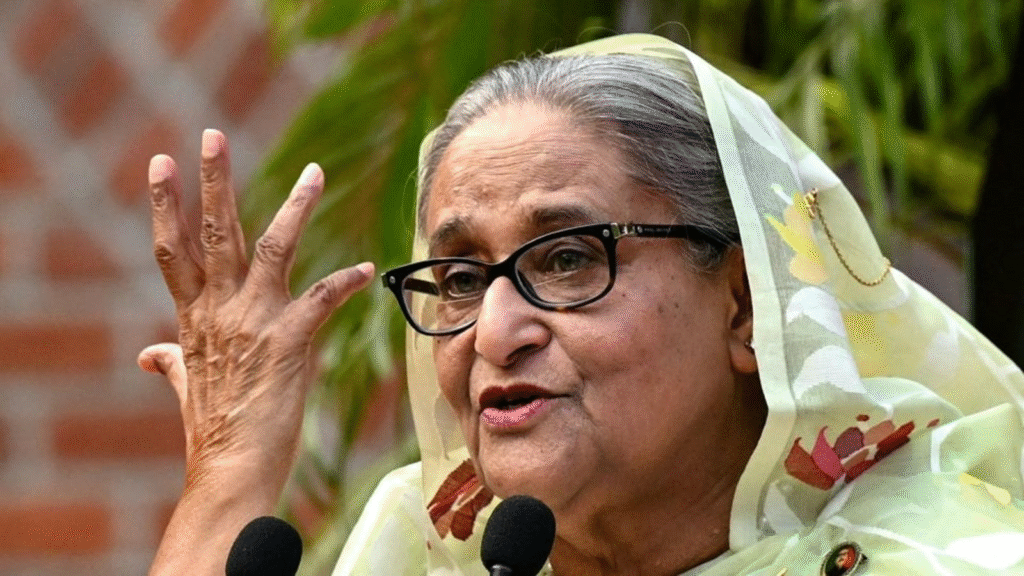Hasina Accuses Yunus of Selling Bangladesh’s Land to the US
What Is the Saint Martin’s Island Controversy?
Recent News Development
Former Bangladesh Prime Minister Sheikh Hasina accused interim leader Muhammad Yunus of “selling” Bangladesh to the United States.
She claimed Yunus is handing over St. Martin’s Island, a strategic location, to the U.S. The accusations came amid rising political tensions in Bangladesh. Hasina made these claims in late May 2025, nearly a year after her ouster. Her statements have reignited debates about Bangladesh’s sovereignty and foreign influence.

On May 25 and 26, 2025, Hasina launched scathing attacks via social media and audio messages. She alleged Yunus seized power with militant support and is compromising national interests.
Reports suggest Yunus considered resigning after military pressure for elections by December 2025. The controversy has deepened the rift between Hasina’s Awami League and Yunus’s interim government.
Background of the Accusation
Sheikh Hasina was ousted as prime minister on August 5, 2024, after massive student-led protests. The protests, initially about job quota reforms, escalated into anti-government unrest.
Hasina resigned and fled to India, where she remains in self-exile. Muhammad Yunus, a Nobel Peace Prize laureate, became interim leader on August 7, 2024. His government was tasked with implementing reforms before elections, set for June 2026.
Hasina’s accusations stem from her claim that Yunus is aligning Bangladesh with U.S. interests. She referenced her father, Sheikh Mujibur Rahman, Bangladesh’s founding leader, who she says was assassinated in 1975 for refusing U.S. demands over St. Martin’s Island.
Hasina alleges Yunus is betraying her father’s legacy by ceding control to foreign powers. She also criticized Yunus for banning her Awami League party, calling it unconstitutional.
Hasina’s Location
Sheikh Hasina has been in self-exile in New Delhi, India, since August 2024. After fleeing Bangladesh amid violent protests, she sought refuge in India, a long-time ally. From India, she has continued to make public statements, often through social media platforms like Facebook.
Her presence in India has strained relations between New Delhi and Dhaka, especially after Yunus requested her extradition. India has not responded to these requests, citing incomplete legal formalities.
Hasina’s exile has fueled controversy, with Yunus accusing her of making “incendiary” remarks from India. Indian Prime Minister Narendra Modi, in a meeting with Yunus in April 2025, urged restraint in rhetoric to preserve bilateral ties. Hasina’s statements from India continue to influence Bangladesh’s volatile political landscape.
How Hasina Accused Yunus
Hasina made her accusations through a Facebook post and an audio message on her party’s official page. On May 25, 2025, she posted a lengthy statement invoking her father’s legacy and accusing Yunus of “selling” Bangladesh. The next day, she released an audio message, calling Yunus a “militant leader” backed by terrorists. She claimed his government released jailed militants, undermining national security.
Her son, Sajeeb Wazed, amplified her claims on X, labeling Yunus a “dictator” enabling mob violence. Hasina’s statements were widely covered by Indian and international media, escalating the political crisis in Bangladesh. She also criticized Yunus for appointing foreign nationals to key posts, alleging they serve U.S. interests.
The Saint Martin’s Island Controversy
St. Martin’s Island is a small, strategic island in the Bay of Bengal, near the Bangladesh-Myanmar border. It holds geopolitical significance due to its location in the northeastern Indian Ocean. Reports suggest the U.S. has shown interest in establishing a military base there to counter China’s regional influence. Hasina claims her father was killed for refusing similar U.S. demands in the 1970s.
The island resurfaced in news after Hasina’s ouster, with allegations that U.S. influence contributed to her downfall. A planned U.S.-Bangladesh military exercise near the island in June 2025 has fueled speculation. Hasina argues that Yunus’s interim government is facilitating U.S. control over the island, threatening Bangladesh’s sovereignty. The controversy remains unconfirmed, with no public response from Yunus’s administration.
Political Implications
Hasina’s accusations highlight Bangladesh’s deepening political crisis. The ban on her Awami League has sparked protests by supporters, while Yunus faces pressure from the military and opposition parties like the Bangladesh Nationalist Party (BNP).
His government’s failure to deliver promised reforms has led to public unrest. The military’s call for elections by December 2025 adds urgency to the situation.
Geopolitical Implications
Geopolitically, the controversy reflects tensions between India, China, and the U.S. Hasina was a close ally of India, while Yunus has sought ties with China, visiting Beijing in March 2025.
His comments about India’s Northeast being “landlocked” strained relations with New Delhi. The U.S.’s alleged interest in St. Martin’s Island underscores its strategic rivalry with China in the Indian Ocean. These dynamics complicate Bangladesh’s foreign relations and domestic stability.


 ICCI invites Bangladesh to boost investment in Pakistan
ICCI invites Bangladesh to boost investment in Pakistan  Trump’s $21M USAID Claim for India Elections Never Existed
Trump’s $21M USAID Claim for India Elections Never Existed  Did India Strike Pakistan’s Nuclear Hub Kirana Hills?
Did India Strike Pakistan’s Nuclear Hub Kirana Hills?  What’s Happening in Iran: India Urges Citizens to Exit
What’s Happening in Iran: India Urges Citizens to Exit  Why Did Bangladesh Choose Mangoes for PM Modi?
Why Did Bangladesh Choose Mangoes for PM Modi?  Principal Arrested for ‘Period Check’ in Thane School
Principal Arrested for ‘Period Check’ in Thane School